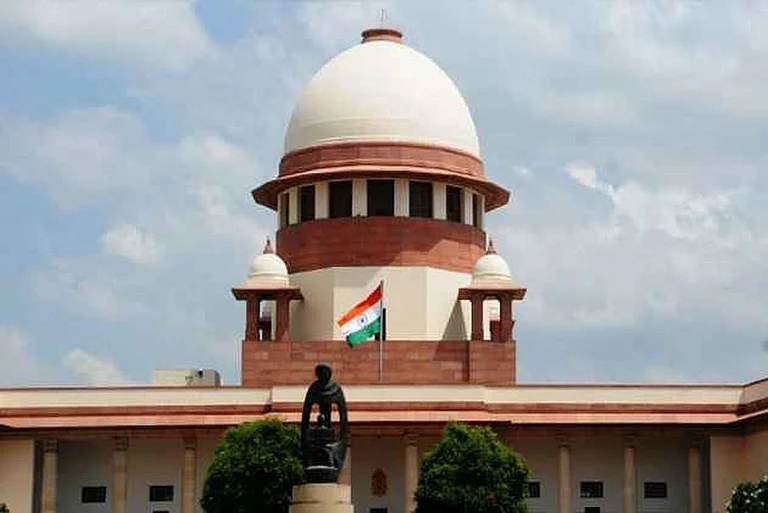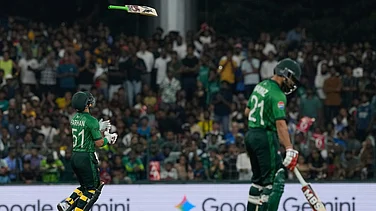A cricket fan may not have got fish and chips at the Edgbaston cricket ground in Birmingham, but make no mistake, there certainly was vada pav. If an Yankee were made to watch the ChaMPions Trophy on television, he could be easily convinced that it was happening at the Wankhede or the Eden Gardens. The on-field signifiers are all eerily Indian—almost all the in-stadia advertisement is by Indian firms or MNCs’ Indian arms like Pepsi, Oppo and MRF. And there were more tricolours flying in all the venues than any other flag.
The Indian presence starts right from the very top—the ICC chairman, Shashank Manohar—and it percolates down to where excited young kids look for autographs and selfies outside the Hyatt Regency hotel in Birmingham, where the Indian team is staying. In between these farthest latitudes, cricket-mad Indians seem to be omnipresent; they are the flavour of the Champions Trophy. Even for the fanatically idolised Team India, this kind of support, in England no less, must still fuel the players, who have reached the semi-finals with just one hiccup against Sri Lanka. “Fans are amazing over here. The support we get is like back home. Big thanks to them from our side,” says the in-form Shikhar Dhawan. Jasprit Bumrah, he of the demoralising, toe-crushing yorkers, is playing his first big international tournament and is as amazed. “There are a lot of Indians coming and supporting us, so it is like in India. We are really happy we have got so much support today,” he said after the win over South Africa that took India into the semis.
Like the colourfully patriotic Brazilian fans descending on a tournament to cheer the Selecao, the indication of an impending Indian fan attack was evident even before the tournamaent began. For India’s warm-up match against New Zealand at The Oval, London, on May 28, about 18,000 people turned up in 22,000-capacity stadium. The millions of Indian cricket fans worldwide are obviously what the advertisers are aiming at. Companies that are either based in India or have a strong presence there fetch close to 80 per cent of revenues to the ICC in the form of sponsors/partners. Apart from the sponsors, the official broadcasters, another fertile source of income, has deep roots in India. STAR India grabbed the rights for the 2015-2023 cycle for reportedly $1.98 billion. STAR India also has the India rights. Besides, two other prominent ICC sponsors—its global partner MRF Tyres and innovation partner Intel—are Indian firms. Even the ICC’s three other global partners—Nissan, Oppo and Emirates—bank heavily on the huge Indian market. Oppo is also the Indian team’s sponsor. Some Indian firms are expanding their horizon beyond the ICC and BCCI. Gujarat-based dairy giant Amul sponsored the New Zealand team at the Champions Trophy, its logo displayed on players’ jerseys.
The ICC itself is mostly run by Indians. Apart from its chairman Manohar, it has about 70 full-time employees at its Dubai headquarters and at least 40 per cent of them are Indians—more than from any another country. England comes second. There are some more people who work on a contract basis.
Indeed, fans from the Indian sub-continent have been making a big contribution to the ICC’s revenues—and that too in multiple ways. Supporters of India, Pakistan and Bangladesh dominated all venues. For example, the India-Pakistan league match in Birmingham and the Bangladesh-New Zealand game in Cardiff was brimming over with supporters of the three Asian countries. On the other hand, stadiums hosting the England matches were, ironically, not full.
Moreover, India’s good showing has meant a sky-rocketing demand for match tickets. A top-ranking ICC official said his friends bought tickets for an India match at four times its price. “Black marketing of tickets is happening in the open here in England. I know this as some of my friends bought the crucial India-South Africa league match gold tickets for £ 200 when they were officially priced at £50. The platinum ticket was priced at £75,” says an ICC official. Quite naturally, the demand for India match increased manifold after Kohli’s boys stormed into the semis. “It’s true, match tickets of Indian games are not available. But Indians living in England are willing to pay [any price] to watch the Indian team’s matches. It’s also true that India is the financial home of cricket. Also, IPL gets a lot of following here in the UK, and the mindset of county cricket administration has also favourably changed (towards India),” says former India pacer Rudra Pratap Singh (Senior), who is now with the Lancashire County Board. He says social media and mobile phone in particular have played its role in bringing cricket to every household in India from anywhere in the world.
Manchester-based Ritesh Shetty, a doctor, had to miss the India-Pakistan match on June 4 despite having a ticket for the high-profile encounter. “I had one £80 ticket that I got in the second round of the lucky draw on the ticket-selling website. But I didn’t go as my son wouldn’t let me go without him,” says Shetty. He gave the ticket to a friend, but he says he could have got £500 for it. Former India wicket-keeper Saba Karim says it is not only in England. “This may be one of the biggest gathering of Indians for a sporting event abroad. However, the 2015 World Cup in Australia drew huge crowds in larger stadiums like the MCG,” says he. Close to 78,000 Indian fans in the 100,000-capacity Melbourne Cricket Ground had turned up for the India-South Africa match in the World Cup.
However, India’s entry into the penultimate round has posed a fresh round of problems to the ICC vis-a-vis the BCCI. So, far the BCCI has been at loggerheads with the ICC, seeking a lion’s share out of the revenues that the world body earns from sponsors based in India. Now, the same group of BCCI officials are putting pressure on the ICC to provide them more tickets for the semis. “It seems the whole of BCCI has turned up in England. Its officials are forcefully demanding tickets for the semi-finals. We’ve told them that all tickets have been sold out. But they are insisting, at times rudely, that they want them at all costs,” says a thoroughly hassled top ICC official. No wonder, because being at as English a ground as the Oval in London, and watching a Kohli inside-out cover drive while munching vada pav, surrounded by a conch-blowing sea of blue, has an ecstatic, anachronistic thrill that is not to be missed. Many must be forgiven for thinking that in cricket’s imperium, they are the new aristocrats.


























